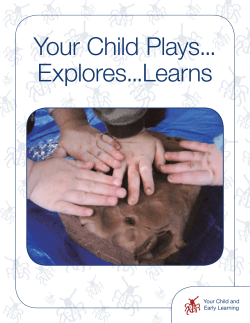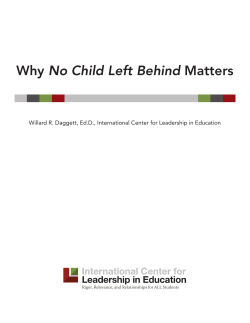
Education, Curriculum and Learning
Page 1 of 4 Kingston Beach Educational Care Effective: April 2014 Next Review: April 2015 Education, Curriculum and Learning Aims Educators aim to create positive learning environments and guide experiences for each child in collaboration with their families. Educators will observe children and facilitate their learning to provide an individual child file containing documentation of their learning throughout the year. Children and their families will be encouraged to participate in the ongoing process to promote engaged learning. Implementation Our Educational Leader is a qualified Early Childhood Teacher, Maggie Bruyn. The role of the educational leader is to work collaboratively with children, families, educators and management to provide curriculum direction, support and encouragement in ensuring children achieve the outcomes of the approved learning framework. Kingston Beach Educational Care is committed to the Early Years Learning Framework (EYLF). The EYLF is a national early childhood curriculum framework which guides educators in developing quality educational programs, with a strong emphasis on play-based learning. The framework describes the principles, practices and outcomes to support and enhance young children’s learning. Observations of all children enrolled in our service will be documented and kept for future reference, reflection and individual analysis of learning. Children’s individual files will be available for a child’s family members to view upon request and will be added to regularly by educators and reflected upon to ensure programming for each child remains relevant to their interests and developmental stage. Early Years Learning Framework Each child’s learning will be based on their interests and strengths and guided by our educators. Educators must work in collaboration with families to provide relevant learning experiences for each child, based on their interests and family experiences. Every child will be equally valued and their achievements and learning celebrated. Educators will observe and record the strengths and learning of each child. Page 2 of 4 Educators will work closely with children and families to generate ideas for curriculum. Learning outcomes will be linked to the curriculum during and after each child’s learning has occurred. The curriculum must not be pre-programmed to match specific learning outcomes. The curriculum will be based on children’s interests, educators extending children’s interests, spontaneous experiences and family input. Where appropriate, the service will liaise with external agencies and support services to best educate and care for children with additional needs, promoting inclusive practice. Where appropriate, the curriculum (play and learning experiences) will build and develop each child’s individual file including learning stories, observations and analysis of learning of each child’s strengths and achievements. The curriculum will be evaluated and reflected upon regularly by educators. Learning and Play Children are encouraged to express themselves creatively through a wide variety of indoor and outdoor activities. Children’s fine and gross motor skills are strengthened and developed through a wide variety of both indoor and outdoor activities including manipulative play, block play, sensory play, dramatic play, drawing and other physical activities such as running and cycling. Mathematics and science concepts, along with exploration of natural aspects of our environment are encouraged through block play, building, cooking, water play, sensory play, collecting natural materials such as leaves and rocks and gardening. Language development is encouraged through educators modelling language, show and tell, story time, games, poems and dramatic play experiences. Social/emotional and independence skills are strengthened through activities such as role play, dramatic play, group games and self-help tasks. Music and movement activities encourage physical, social and creative areas of a child’s development. Road safety, hygiene, dental care and nutrition will all be built into the program. Page 3 of 4 These activities will be supervised and guided by educators to find out how a child responds as an individual and also as part of a group. Educators will work in collaboration with families to provide learning experiences that are relevant to each child and tailored to their specific needs. A child’s home language, culture and religious practices will be accepted and included in the program. From this, educators will assess the child’s needs and plan ways to meet these needs. We evaluate this program regularly to ensure we are providing high quality education and care to assist each child to reach their full potential. Experiences of the program are documented in each room it takes place in. We welcome any suggestions and are happy to answer questions from families at any time. At the forefront of each room’s program is developing respectful and trusting relationships with children and families. Each child’s age and stage of development will be considered, with flexible processes within each of our room environments. Further information on each of our room’s programs are provided upon enrolment, when updated and at any time by request. EYLF Learning Outcomes 1. Children have a strong sense of identity. 2. Children are connected with and contribute to their world. 3. Children have a strong sense of wellbeing. 4. Children are confident and involved learners. 5. Children are effective communicators. National Quality Standards QA1 1.1.1 Curriculum decision making contributes to each child’s learning and development outcomes in relation to their identity, connection and community, wellbeing, confidence as learners and effectiveness as communicators. 1.1.2 Each child’s current knowledge, ideas, culture, abilities and interests are the foundation of the program. 1.1.3 The program, including routines, is organised in ways that maximise opportunities for each child’s learning. 1.1.4 The documentation about each child’s program and progress is available to families. 1.1.5 Every child is supported to participate in the program. 1.1.6 Each child’s agency is promoted, enabling them to make choices and decisions and to influence events and their world. 1.2.1 Each child’s learning and development is assessed as part of an ongoing cycle of planning, documenting and evaluation. Page 4 of 4 1.2.2 Educators respond to children’s ideas and play and use intentional teaching to scaffold and extend each child’s learning. program. 1.2.3 Critical reflection on children’s learning and development, both as individuals and in groups, is regularly used to implement the program National Regulations Regs 73 Educational Programs 74 Information about the educational program to be kept available 75 Information about educational program to be given to parents 76 Documenting of child assessments or evaluations for delivery of educational program Early Years Learning Framework LO1 – LO5 All Learning Outcomes under the Early Years Learning Framework will be addressed through our policy and practices. Sources Education and Care Services National Regulations National Quality Standards Early Years Learning Framework Related Policies Child Protection Excursions Food, Nutrition and Beverage Health, Hygiene and Safe Food Infectious Diseases Interactions with Children
© Copyright 2025













